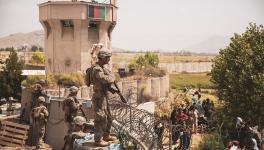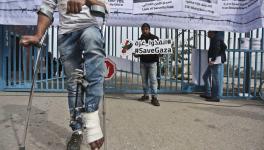UN Slams India's Threat to Expel Rohingyas

Newsclick Image by Nitesh Kumar
India’s decision to deport Rohingya refugees back to Myanmar or Bangladesh has drawn sharp criticism from the United Nations Human Rights Council (UNHCR). UN High Commissioner for Human Rights Zeid Ra'ad Al Hussein termed India’s plans for deportation “deplorable”.
Hussein criticized the decision of the Union Minister of State for Home Affairs Kiren Rijiju for planning “collective expulsions, which is asking people to return to a place where they risk torture or other serious violations”.
The decision to deport as many as 40,000 Rohingya refugees living in India came in early August. Since then several rights groups including the UN have urged India to reconsider its decision. For refugees, including the 14,000 registered under UNHCR, however, the threat of expulsion has become more evident.
India has reacted bluntly and expressed disapproval over the remarks made by Hussein on the issue of Rohingya refugees.
Ambassador Rajiv K Chander, the Permanent Representative of India to the UN, termed Hussein’s observations as perplexing and tendentious judgments made on the basis of selective and even inaccurate reports.
The Rohingyas, often referred to as the world’s most persecuted community, have faced renewed violence since last month in their home country Myanmar. This has forced hundreds of thousands of Rohingyas to flee the country.
Myanmar has a Buddhist majority population and doesn’t recognize Muslim Rohingyas as its own citizens. During the refugee exodus in the early 1990s, some 2,50,000 fled Myanmar in an arduous journey into neighbouring Bangladesh. More than 2,35,000 Rohingyas have since been repatriated, leaving a little over 20,000 currently living in poor conditions in the two state-run camps in Bangladesh’s Cox’s Bazar district. The number fluctuates as Rohingyas move to other countries like Saudi Arabia, Malaysia and Pakistan but only if they can afford and survive the journey.
The Rohingyas living in New Delhi are the ones who managed to collect at least a few thousand Indian rupees and fled in desperation risking their own lives and the lives of their families and relatives as well. Only the poorest and weakest stayed back in Myanmar.
Since Rijiju spelt out his plan, the Rohingya population living in camps around the national capital has expressed deep fear and apprehensions.
The Indian authorities claim the Rohingya refugees pose a security threat and are vulnerable to religious radicalisation. The Indian state has been criticised for harbouring an alleged communal bias against Rohingyas living in several cities across the country, a claim that the government denies.
Get the latest reports & analysis with people's perspective on Protests, movements & deep analytical videos, discussions of the current affairs in your Telegram app. Subscribe to NewsClick's Telegram channel & get Real-Time updates on stories, as they get published on our website.
























